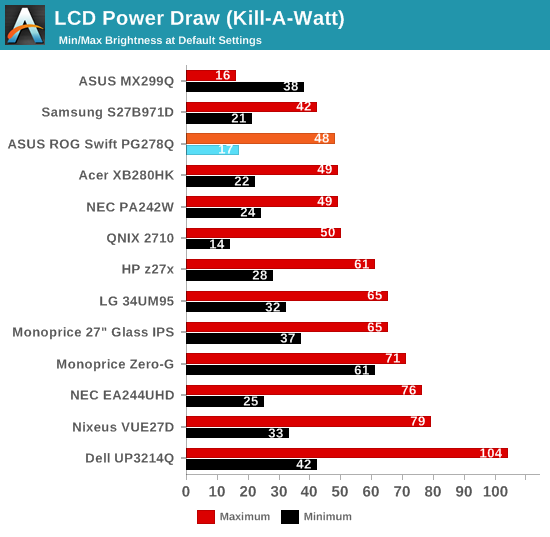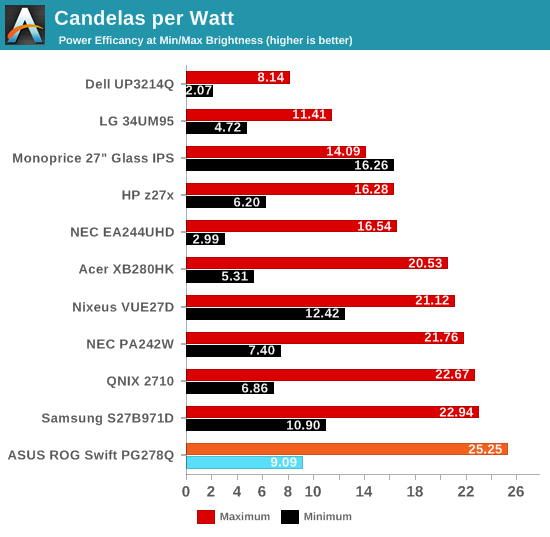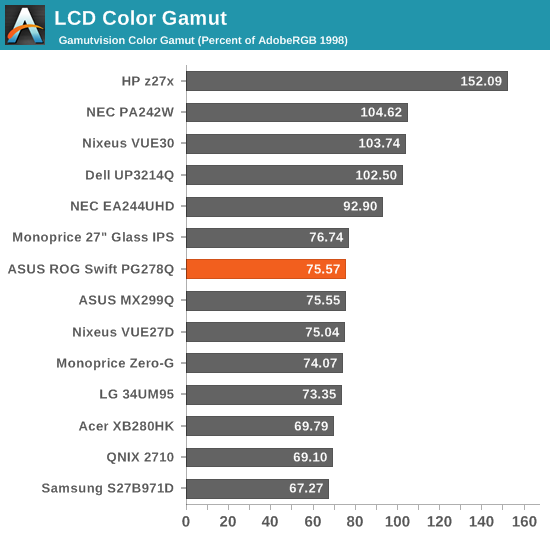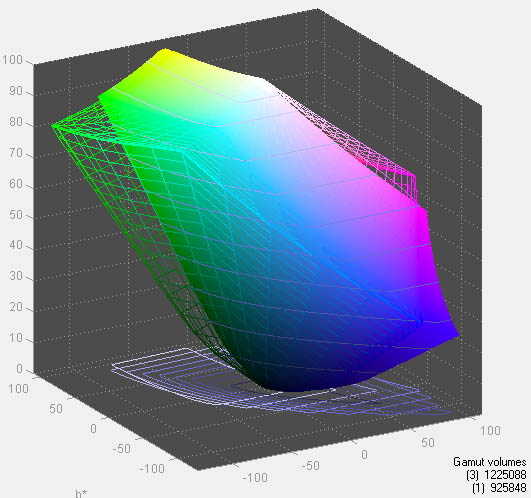ASUS ROG Swift PG278Q G-SYNC Monitor Review
by Chris Heinonen & Jarred Walton on February 13, 2015 10:00 AM ESTPower Use, Gamut, Input Lag
With a full white screen and the brightness set to maximum, the ASUS ROG uses 48 watts of power. Setting the backlight to the minimum setting reduces this down to 17 watts.


The ASUS ROG reproduces 75.57% of the AdobeRGB gamut. This puts it solidly in the sRGB color gamut, just about what we expected from looking at the earlier pre- and post-calibration results. No G-SYNC monitors have gone beyond the sRGB gamut at this point, and until there is a gaming oriented panel that is only available in a wide-gamut version, I don’t expect to see one. It just isn’t a critical feature for gaming compared to other things.

Like the other G-SYNC displays I have tested, the ASUS ROG has no inputs aside from a single DisplayPort. Because I have no CRT monitor that can run at the same native resolution as it, nor a DisplayPort compatible lag tester, I can’t produce an accurate input lag measurement for the display. Obviously this is not an ideal result for a gaming display, but any number I could produce I would have zero faith in.











101 Comments
View All Comments
RandomUser13 - Friday, February 13, 2015 - link
Friday the 13th and this is the first comment, great!Great review by the way.
TerdFerguson - Sunday, February 15, 2015 - link
C'mon, the review started with "The ASUS Republic of Gamers (ROG) line includes everything you want for building a high-end gaming." How can anyone trust a review that contains drivel worse than a press release?Jaaap - Sunday, February 15, 2015 - link
Yes. For building *a* high-end gaming PC.Not for building the best or the cheapest or whatever.
It's a statement about the completeness of the line-up.
Antronman - Sunday, February 15, 2015 - link
Because it's true since it's ASUS' top-end product line?Anon Zero - Friday, November 27, 2015 - link
And the winner for "Most Asinine Comment IS...(drumroll)QuantumPion - Friday, February 13, 2015 - link
I tried buying an ROG Swift and really liked the panel's speed, color, and g-sync. However I went through 4 monitors, all defective, before finally giving up. One monitor was utterly damaged (cracked LCD panel). The other 3 had extremely bad color calibration with gamma as low as 1.6, making everything extremely washed out and looking worse than a low end budget LCD from 2005. The gamma was so far off that attempting to calibrate it caused terrible color banding and white/black crushing.Inglix - Friday, February 13, 2015 - link
It took me four months and 5 monitors to get a non-defective one.I've since had a nightmare where it fails with red lines down the middle. Asus RMA support reportedly ships them back in a back in a normal cardboard box with one piece of crushed paper to protect it.
cknobman - Friday, February 13, 2015 - link
Pay the Nvidia tax, lolNo thanks G-SYNC is not worth an extra $400 for a crappy TN panel.
PlugPulled - Friday, February 13, 2015 - link
i got to agree with you. But its the best TN panel out there for 144hz with 3d vision and Gsync. Can't get lower response time on IPS.yefi - Friday, February 13, 2015 - link
No longer the case. Acer XB270HU - 144Hz IPS.